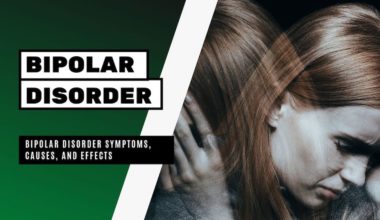Personality can be defined as a way of thinking, feeling, and believing that makes every person different from the other. This is considered as a type of mental disorder defined by long term behavior that deviates from what is expected and causes immense stress and damage relationships. In this article, we will discuss personality disorder symptoms, causes, effects, and treatments.
How Personality Disorder Affects
Personality disorders affect at least two of these areas:
- Way of thinking about oneself and others
- Way of responding emotionally
- Way of relating to other people
- Way of controlling one’s behavior
Personality Disorder Symptoms and Types
There are many types of personality disorders, and each has a group of symptoms. Below, we have listed all types of personality disorder and their symptoms.
1. Antisocial personality disorder
- Impulsive behavior
- Involvement in theft and other crimes
- Constant lying
- Irresponsible behavior
- Violating the rights of others
- Disregard about other people’s feelings
- Not caring about their own security
- No feelings of remorse for their behaviors
2. Borderline personality disorder
- Feelings of loneliness and emptiness
- Fear of being alone or abandoned
- Impulsive behavior
- Unstable relationships
- Mood swings
- Suicidal thoughts
- Intense anger
3. Histrionic personality disorder
- Rapidly fluctuating emotions
- Highly concerned about physical appearance
- Constantly seek attention from others and can be emotional and dramatic to do so
- Can be easily influenced by others
4. Narcissistic personality disorder
- Arrogance and pride
- Believing that he/she is more important and special than other people
- Constant envy
- Exaggerating talents and achievements
- Expectations of admiration and favors from others
- Fantasies about power and success
5. Avoidant personality disorder
- Avoiding interaction and other social activities
- Socially isolated
- Extremely timid in relationships and social situations
- Fear of disapproval or being made fun of
- Extremely sensitive to criticism
6. Dependent personality disorder
- Lack of self-confidence
- Submissive behavior
- Fear of providing self-care
- Requiring excessive advice to make even small decisions
- Hesitation to disagree with others, fearing disapproval
- Tolerance of abuse
- Urgent need to start a new relationship when the current one has ended
7. Obsessive-compulsive personality disorder
- Aiming for constant perfection, which leads to extreme stress when it is not achieved
- Being occupied with rules and keeping things in order
- Need to always be in control of tasks
- Not being able to delegate tasks
- Not flexible and stubborn behavior
8. Paranoid personality disorder
- Not being able to trust others
- Taking innocent remarks to be insults
- Distrust and suspicion towards other people
- An unjustified belief that people are trying to harm them
- Extreme hostile reactions to perceived insults
- Hold grudges
9. Schizophrenia personality disorder
- Limited emotional expression
- Appear to be indifferent
- Prefer to be alone
- Lack of interest in relationships
10. Schizotypal personality disorder
- Strange dressing and behavior
- Limited emotions
- Social anxiety
- A belief that you can influence people and events with your thoughts
Personality Disorder Causes
Personality, which is defined as a combination of thoughts, feelings, and behaviors, takes shape during childhood. It forms from a combination of:
Genes: Some personality traits, or temperament, can be passed on to you by your parents through the genes inherited.
Environment: This includes the environment you are brought up in, the events that you have experienced, and your relationships with family members and others.
Personality disorders are thought to be caused by a combination of these genetic and environmental influences. Your genes may make you vulnerable to developing a personality disorder, and an event you go through may trigger the development of the disorder.
Risk Factors: Although the precise cause of personality disorders is not known, certain factors seem to increase the risk of developing or triggering personality disorders, including:
- Family history of personality disorders or other mental illness
- Abusive, unstable or chaotic family life during childhood
- Being diagnosed with childhood conduct disorder
- Variations in brain chemistry and structure
Personality Disorder Effects
The quality of life of people with personality disorders can be significantly affected, which is why it is important to receive prompt treatment for this disorder. Some effects of it include:
- Being fired from the job
- Inability to make responsible financial decisions
- Poor relationships
- Self-injury
- Trying to physically hurt others
- Feeling unworthy and hopeless
- Involvement in crimes and getting arrested
- Suicidal thoughts
- Suicide attempts
- Abuse and addiction to drugs and alcohol
- Can develop additional mental disorders
Personality Disorder Treatments
Personality disorders can be treated with certain types of psychotherapy, in which a person gains knowledge about the disorder and its symptoms. Moreover, the person also talks about his/her feelings, thoughts and behaviors. Psychotherapy can also help a person understand the effects of their behavior on others and learn to manage or cope with symptoms. They can also know about how to decrease behaving in ways that are detrimental to their functioning and their relationships. Some types of psychotherapy which are commonly used are:
- Psychoanalytic/psychodynamic therapy
- Dialectical behavior therapy
- Cognitive-behavioral therapy
- Group therapy
- Psychoeducation (teaching the individual and family members about the illness, treatment, and ways of coping)
There are no specific medicines that are prescribed to treat personality disorders. However, medication, such as antidepressants, anti-anxiety medication, or mood-stabilizing medication, may be helpful in treating some symptoms. Symptoms that are more severe may require treatment with a team involving a primary care doctor, a psychiatrist, a psychologist, a social worker, and family members.
Moreover, certain self-care techniques and coping strategies can also be adapted to help people with personality disorders. Some of them are:
- Engage in physical activity, as it can help manage stress, depression, and anxiety
- Avoid the use of drugs and alcohol, which can actually worsen the symptoms and even interfere with the effects of the medicines.
- Learn about the condition and its symptoms
- Get routine medical check-ups
- Join a support group
- Writing in a journal can help in expressing emotions
- Avoid social isolation and stay connected with family and friends.
- Engage in relaxation and stress management techniques such as yoga and meditation
Family members are also important in a person’s recovery process and can also learn about the most effective ways to provide help and support. But taking care of a person diagnosed with a personality disorder can prove to be quite stressful for the family as well. Hence, it is also important for the family members to consult a mental health provider who can assist in dealing with the difficulties.
Personality disorders can significantly affect a person’s quality of life in a negative way. Hence, it is important for individuals to receive prompt treatment and medication, and effectively follow the treatment plans to lessen the intensity of the symptoms.





